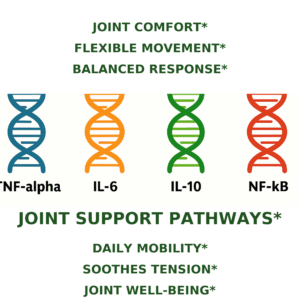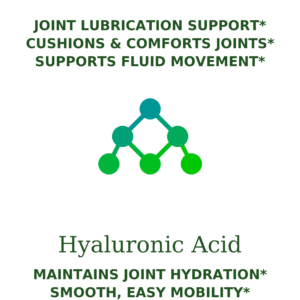ArthritiCare by Nature

Arthritis support works best when you support your body, not fight it.
ArthritiCare by Nature combines Moringa, Boswellia, and Green Tea into one clean, plant-based formula designed to support not just joint comfort, but whole-body wellness—including the persistent fatigue many people with arthritis quietly experience. [6][12][13] When inflammation remains active, immune signaling and oxidative stress increase the body’s demand for protective nutrients and recovery resources, which can leave people feeling physically drained even on days when pain feels manageable. [14][15] That’s why a daily, food-based routine can feel steadier over time: it supports the body as it manages joint stress, inflammation, and the overall energy cost of living with arthritis. [6][12][14].
Research has identified more than one hundred distinct types of arthritis and joint-related conditions, each involving complex interactions between inflammation, tissue stress, and mobility—meaning no single approach fits everyone. [1][2] ArthritiCare by Nature is designed to support the body’s natural ability to maintain joint comfort and flexibility. [2][10] Many individuals notice a natural sense of relief, ease of movement, and improved joint comfort as part of their ongoing wellness routine—supporting the body’s natural cushioning and lubrication between joints for a smoother, more comfortable range of motion, often helping daily activity feel less physically draining over time. [2][7][8][13][15] ArthritiCare is a trusted, long-term ally for joint health and flexibility. [10][11]
ArthritiCare by Nature is available at Amazon
 Research in the fields of arthritis and joint-health sciences has identified TNF-alpha, IL-6, IL-10, and NF-κB as key genetic signaling regulators that help maintain the body’s normal immune and inflammatory balance. [3][4] These molecular pathways coordinate how joint tissues naturally respond to everyday wear, physical stress, and the aging process—contributing to overall joint comfort, flexibility, and recovery. [3][5] These same inflammatory signals are also closely linked to arthritis-related fatigue, helping explain why tiredness can feel like more than just poor sleep. [13][15]
Research in the fields of arthritis and joint-health sciences has identified TNF-alpha, IL-6, IL-10, and NF-κB as key genetic signaling regulators that help maintain the body’s normal immune and inflammatory balance. [3][4] These molecular pathways coordinate how joint tissues naturally respond to everyday wear, physical stress, and the aging process—contributing to overall joint comfort, flexibility, and recovery. [3][5] These same inflammatory signals are also closely linked to arthritis-related fatigue, helping explain why tiredness can feel like more than just poor sleep. [13][15]
 ArthritiCare by Nature supports optimal joint function by helping the body maintain healthy lubrication and natural cushioning within the joints for fluid, comfortable movement. [7][8] This advanced, plant-based blend nourishes cartilage and supports the body’s natural production of joint fluids that help keep motion effortless and balanced. [7][8] Research in scientific journals has shown that hyaluronic acid—a key component of joint fluid—plays an important role in supporting smooth mobility and comfortable joint movement. [7][8] By promoting proper hydration within connective tissues, ArthritiCare helps sustain smoother motion, greater flexibility, and long-lasting joint comfort. [7][8] Working in harmony with your body, this clean, plant-based formula delivers lasting nourishment for your joints—pure, powerful, and naturally effective. [6]
ArthritiCare by Nature supports optimal joint function by helping the body maintain healthy lubrication and natural cushioning within the joints for fluid, comfortable movement. [7][8] This advanced, plant-based blend nourishes cartilage and supports the body’s natural production of joint fluids that help keep motion effortless and balanced. [7][8] Research in scientific journals has shown that hyaluronic acid—a key component of joint fluid—plays an important role in supporting smooth mobility and comfortable joint movement. [7][8] By promoting proper hydration within connective tissues, ArthritiCare helps sustain smoother motion, greater flexibility, and long-lasting joint comfort. [7][8] Working in harmony with your body, this clean, plant-based formula delivers lasting nourishment for your joints—pure, powerful, and naturally effective. [6]
Arthritis fatigue responds best to steady natural support — not force.
Arthritis fatigue is rarely solved by pushing harder. When the body is already carrying the energy cost of ongoing inflammation, “forcing through” can deepen the crash that comes later. [13][15] A steadier approach is to support your baseline—day after day—with food-based nutrition that helps the body stay more resilient while it manages inflammatory stress, tissue recovery, and everyday movement demands. [6][14][15] That’s how fatigue often shifts in real life: not as a dramatic flip, but as a gradual return of steadier energy and a day that takes less out of you. [13][15]
The multi-pronged, plant-based nutrients in ArthritiCare by Nature naturally support these pathways, helping the body maintain joint integrity, flexibility, and comfort in well-researched, natural ways. [5][6] Because arthritis often involves long-term inflammatory stress, steady nutritional support can play an important role in helping the body avoid feeling depleted over time. [14][15] This clean, research-inspired formula works in harmony with your body, offering gentle, effective support without harsh synthetic additives or unnecessary chemicals your body doesn’t need. [6][12]
ArthritiCare by Nature supports optimal joint function by helping the body maintain healthy lubrication and natural cushioning within the joints for fluid, comfortable movement. [7][8] This advanced, plant-based blend supports the body’s natural production of joint fluids that help keep motion effortless and balanced. [7][8] Research has shown that hyaluronic acid—a key component of joint fluid—plays an important role in supporting smooth mobility and comfortable joint movement. [7][8] When movement feels smoother and less mechanically demanding, everyday tasks often take less out of you—because mobility and energy are closely connected for many people living with arthritis. [13][15]
ArthritiCare by Nature is crafted to provide effective, natural joint support at a fraction of the cost of many synthetic or complicated alternatives. [10] Each serving delivers plant-based nutrients that work in harmony with your body to help maintain healthy joint lubrication, flexibility, and comfort—supporting smooth, fluid movement without costly treatments or unnecessary additives. [10][12] With ArthritiCare, you get clean, food-based, science-backed ingredients designed to support lasting joint wellness and steadier day-to-day vitality at a low price, making consistent support accessible rather than occasional. [6][10][12][14]
oint stiffness and discomfort can gradually increase over time, which is why taking steps to support long-term joint health early is so important. [2][9] For people living with arthritis, a food-based, non-synthetic approach can work with the body—not against it—and many people notice steadier support over time. [6][11][12] That steadiness matters, because fatigue is one of the most disruptive and under-recognized symptoms of arthritis, sometimes impacting quality of life even more than pain itself. [13]
At ArthritiCare by Nature, we’re deeply committed to your health, happiness, and confidence. Many customers notice meaningful improvements within the first few weeks or after their first bottle. [11] If you begin to feel noticeable improvements in your comfort, mobility, or joint fluidity, we encourage you to make ArthritiCare by Nature part of your daily routine.
Consistent use allows your body to continue benefiting from the natural nutrients that support lasting joint comfort, flexibility, and ease of movement. [10][11] For many people, consistency also supports that “I can get through the day” feeling—because supporting inflammation, movement efficiency, and nutrient demand together is often what helps energy feel more stable. [14][15] We stand behind every bottle because we believe natural care should come with peace of mind. [12]
Explore in-depth information on every ingredient and the peer-reviewed studies highlighting its role in inflammation regulation, mobility support, and sustained joint wellness.
FOOTNOTES & REFERENCES
[1] World Health Organization.
Musculoskeletal conditions.
https://www.who.int/news-room/fact-sheets/detail/musculoskeletal-conditions
[2] Hunter DJ, Bierma-Zeinstra S.
Osteoarthritis. The Lancet. 2019;393(10182):1745–1759.
https://doi.org/10.1016/S0140-6736(19)30417-9
[3] Firestein GS, McInnes IB.
Immunopathogenesis of rheumatoid arthritis. Immunity. 2017;46(2):183–196.
https://doi.org/10.1016/j.immuni.2017.02.006
[4] Smolen JS, Aletaha D, McInnes IB.
Rheumatoid arthritis. Nature Reviews Disease Primers. 2018;4:18001.
https://doi.org/10.1038/nrdp.2018.1
[5] Gupta SC et al.
Regulation of inflammatory pathways by natural dietary agents.
Biochimica et Biophysica Acta – Molecular Basis of Disease. 2014;1842(12):2456–2466.
https://doi.org/10.1016/j.bbadis.2014.02.014
[6] Calder PC.
Dietary factors and low-grade inflammation. Nutrition Research Reviews. 2013;26(2):169–180.
https://doi.org/10.1017/S095442241300016X
[7] Cowman MK et al.
Hyaluronan: A multifunctional, megadalton, stealth molecule.
Arthritis Research & Therapy. 2015;17:92.
https://doi.org/10.1186/s13075-015-0607-6
[8] Altman RD, Moskowitz R.
Hyaluronic acid in the treatment of osteoarthritis of the knee.
Osteoarthritis and Cartilage. 1998;6(2):85–92.
https://doi.org/10.1053/joca.1998.0091
[9] Litwic A et al.
Epidemiology and burden of osteoarthritis.
British Medical Bulletin. 2013;105:185–199.
https://doi.org/10.1093/bmb/lds038
[10] Bannuru RR et al.
OARSI guidelines for the non-surgical management of osteoarthritis.
Osteoarthritis and Cartilage. 2019;27(11):1578–1589.
https://doi.org/10.1016/j.joca.2019.06.011
[11] Messier SP et al.
Effects of diet and exercise on osteoarthritis symptoms and function.
JAMA. 2013;310(12):1263–1273.
https://doi.org/10.1001/jama.2013.277669
[12] U.S. Food and Drug Administration.
Dietary Supplements: Structure/Function Claims.
https://www.fda.gov/food/dietary-supplements/structurefunction-claims
[13] Katz P.
Fatigue in Rheumatoid Arthritis.
Current Rheumatology Reports.
[14] Valko M et al.
Free radicals and antioxidants in normal physiological functions and human disease.
International Journal of Biochemistry & Cell Biology.
[15] Straub RH et al.
Energy regulation and neuroendocrine-immune control in chronic inflammatory diseases.
Arthritis Research & Therapy.
